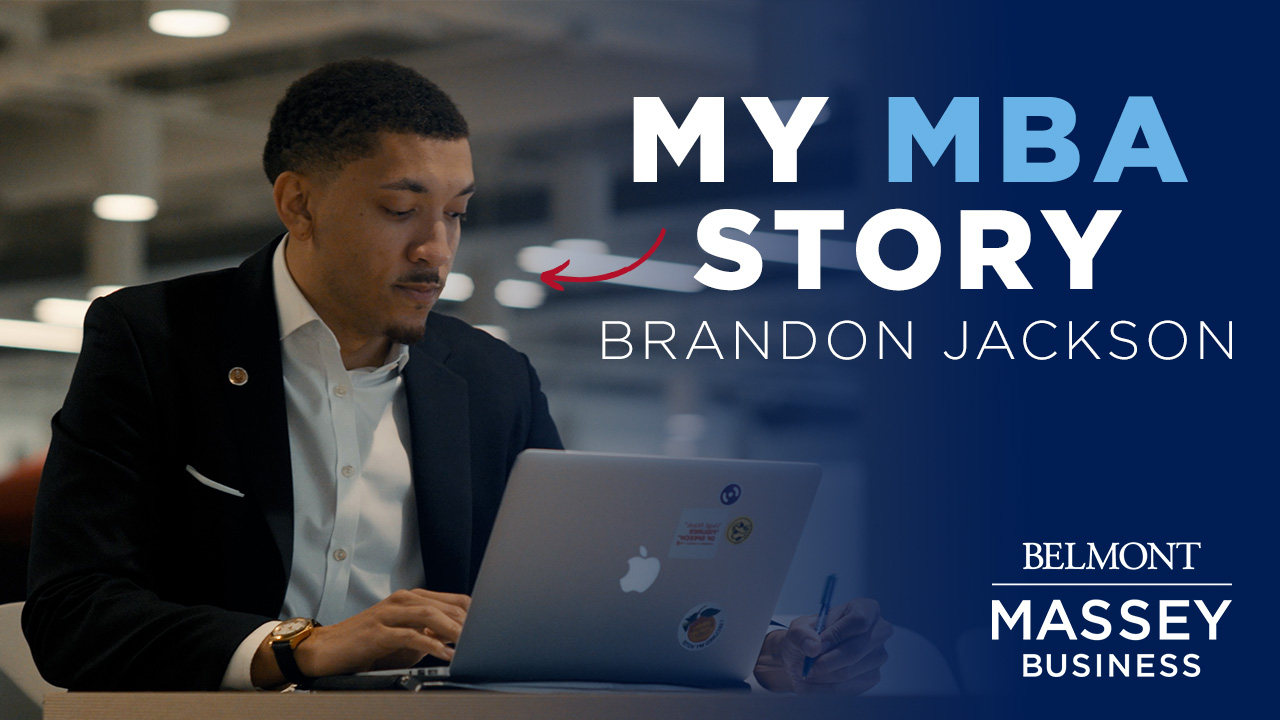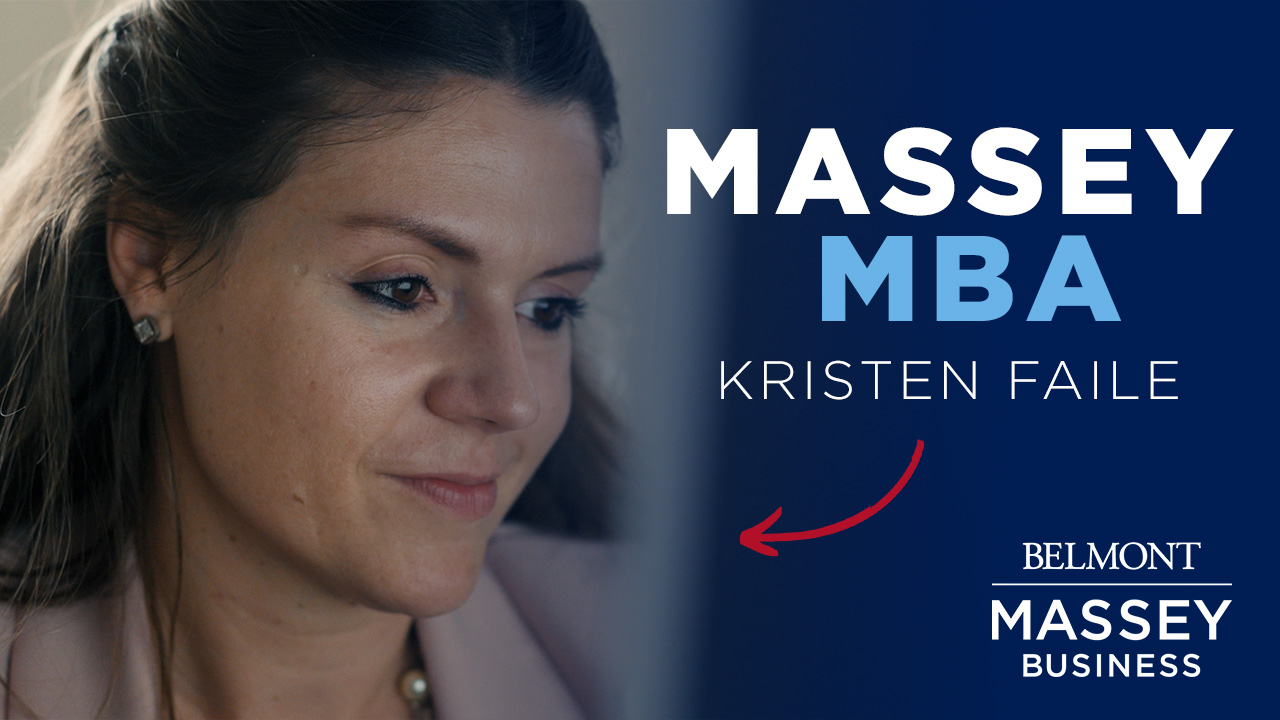Why a Professional MBA?
The foundation of PMBA is flexibility, enabling students to successfully balance work, graduate school and personal life. Students generally complete the PMBA between 15 months and two years selecting courses that are in person, online or a mix of the two. Online course offerings are rotated each semester to ensure students attending online only can finish the full curriculum in two years. This program now offers a STEM designated curriculum option!
PMBA students can begin the program in the fall, spring or summer semesters. Elective courses are offered in accounting, business intelligence, entrepreneurship, finance, healthcare management, international business, marketing, music business and negotiation and mediation.
One characteristic that distinguishes the Massey Graduate School of Business is the personal attention given to each student’s learning needs and professional goals. Enrollments are managed to ensure small class sizes (an average of 25 students in core classes and 14 in electives) so that students have significant opportunities to interact with each professor and their peers. All faculty are deeply committed to ensuring that the learning environment is effective for each individual. Technology resources have been developed to ensure online courses are interactive and engaging for students.
Why STEM Degrees Are Important:
STEM degrees are crucial for developing a skilled workforce to drive innovation and address global challenges. They include an emphasis on analytical skills that are attractive to employers. For international students, STEM designated programs offer a two-year extension to the standard one-year Optional Practical Training (OPT) program. The opportunity to work for three years post grad expands the job opportunities available to STEM graduates.
What You'll Learn
- Use of the accounting systems within an organization and in communicating externally
- Overview of the key tools, concepts, and theories of data analytics and information technology management
- Basic financial concepts, tools, and techniques used by financial managers
- Core concepts and principles of marketing management
- Foundation and understanding for developing managerial, intrapersonal, and interpersonal skills within organizational settings
Program Details
Curriculum
Professional MBA students complete core courses that cover the functional areas of business: accounting, business law, finance, management, marketing, business technology, leadership, ethics, and strategic management. Online course offerings are rotated each semester to ensure students attending online only can finish the full MBA curriculum in two years. In addition, students select three elective courses.
Courses You'll Take
ACC 6480: Applied Accounting
Accounting supports decision-making, measures results, documents performance and motivates behavior. This class examines managers' use of the accounting systems within an organization and in communicating externally. In particular, the class considers revenue recognition, service/product costing systems, financial statement analysis, management control systems, performance incentives and operating budgets.
BSA 6500: Data Analytics & Technology Management
This course provides an overview of the key tools, concepts and theories of data analytics and information technology management. Students will consider various technologies that may be used to develop and improve organizational strategy, decision-making and operational effectiveness. Additionally, students will get hands-on experience working with various tools for descriptive and predictive data analytics in order to translate business problems into data analyses that provide actionable insights.
ECO 6300: Managing Global Risks and Reputation in a Complex Business World
This course consists of an overview of the global business framework in which companies operate today. The course focuses on the opportunities and risk assessment of entry into global markets and operation of global firms within the context of the economic, financial, governmental, geopolitical, cultural and social environment.
FIN 6100: Financial Management
This course contains the basic financial concepts, tools and techniques used by financial managers. The topics covered include cash flow analysis, stock and bond valuation, capital budgeting, risk and return, the cost of capital, long-term financial planning and strategic financial decisions.
MKT 6450: Marketing Management
This course introduces students to the core concepts and principles of marketing management. Specifically, this course provides students the opportunity to study and practice an economics-oriented, framework-based approach to analyzing and “solving” marketing problems while enhancing critical thinking, group decision-making, written and oral communication and analytical skills. The purpose of this approach is to equip students not only with a structured knowledge of marketing strategy and tactics but also with the facility to apply this knowledge in a wide variety of business and organizational settings. Methods of instruction include outside reading, lecture and case discussion.
MGT 6150: Management of Interpersonal Relationships
With an ever-changing virtual business landscape and in the face of disruptive technologies, successful relationship management is crucial in remaining flexible and viable in today’s competitive workforce. MGT 6150 provides a foundation and understanding for developing managerial, intrapersonal and interpersonal skills within organizational settings including effectively leading and working within groups and teams. Through the theoretical lens of organizational behavior and global human resource management, this interactive course analyzes a broad range of topics to ensure individuals facing workplace challenges are apt in communication, decision-making and managing oneself and others. Further, the exploration of self-awareness provides a personal narrative to develop individual skill sets necessary for productive professional growth.
MGT 6320 Leadership, Ethics & Management of Social Issues
This course examines current and perennial management issues encountered in the social environment of business, developing leadership and decision-making skills to address these issues successfully. Important management issues will be investigated, such as: legal and regulatory conditions, business contracts and torts, employment law, ethical considerations in business from a stakeholder theory perspective, types of management leadership styles and patterns of power corresponding to them. Ethical and legal astuteness requires a set of value-laden attitudes, context-specific knowledge of ethics and the law, precise leadership and the appropriate application of these tools.
MGT 6550: Operations & Supply Chain Management
The first half of this course is focused on the design, integration and improvement of the interrelated work activities that combine to produce an organization's products or services. Emphasis is placed on well-designed and well-managed operations as a source of customer satisfaction, reduced cost, and sustainable competitive advantage. Topics include product and service design, process design and improvement, process technology, process planning and scheduling, strategies for dealing with fluctuating demand, procurement and supply management and management of people. Quantitative models useful for operations analysis and decision-making are included.
The second half of this course will introduce students to the terminology, concepts and skills related to supply chain management. The study of supply chain management involves the management of key business processes, the flow of goods and information, and relationships with fellow members of the supply chain. Students will develop an understanding of the complexities associated with the physical movement of goods and information and how they affect the mission of the firm. Discussions will address the various processes and activities within an organization and how they interface with other members of a global supply chain.
MGT 6850: Crafting & Implementing Strategy
This course explores how organizations in all life cycle stages create, deliver, and capture value through the ability to formulate and implement successful strategies. Key areas include strategy and entrepreneurship theory and schools of thought, external and internal environmental analysis, strategic alternatives and implementation challenges. A variety of industry and organizational settings are examined to compare and contrast constraints and perspectives of startup and mature organizations. Instructional methods include a combination of readings, case studies, a business simulation, group and class discussions, guest speakers and a course project.
Prerequisite Requirements:
PMBA – ACC 6480, FIN 6100, MGT 6550 and MKT 6450;
HCMBA – ACC 6490, MGT 6450 and MKT 6450;
AMBA – ACC 6480, FIN 6100, MKGT 6450 and coreq: MGT 6550
Elective Courses
In addition to the core curriculum and global practicum, PMBA students are able to choose three electives. Not every elective is offered every semester, so be mindful of that as you course plan. Professional MBA students can select courses from any of the following courses:
Accounting*
Accounting electives may be chosen from the courses listed in the Master of Accountancy course page.
*Eligibility requires a minimum of 18 hours of previous undergraduate accounting coursework.
BSA 6050: Database Modeling, Design and Analysis - STEM Approved
This course provides students with skills that facilitate the effective use of database management systems. Key components of this course include relational data modeling along with database design, development and implementation. Students will query and analyze data using SQL to create useful insights and generate recommendations for action.
BSA 6230: Healthcare Analytics - STEM Approved
This course introduces students to the core concepts, foundational skills and knowledge of healthcare analytics and provides students with the ability to extract, analyze and interpret data from patients’ health records, insurance claims and hospital financial records to drive actionable insights and improve performance. Students will gain hands-on experience with tools like Microsoft Excel and Power BI to understand and develop insights from data to improve patient care and services.
BSA 6820: Predictive Analytics - STEM Approved
This course provides students a practical, hands-on learning environment focusing on data mining and predictive analytics to solve business problems. Students will prepare data, create and validate predictive models and deploy those models to predict future events and uncover hidden patterns of behavior. Students will examine how data analysis technologies can be used to improve decision-making by studying the fundamental principles and techniques of data mining to develop data-analytic thinking.
Prerequisites: BSA 6050 (formerly 6930) or Instructor permission
ECO 6400: Global Managerial Economics
Global managerial economics will integrate economic theory, data analytics and global affairs to guide business decisions and solve business problems. This course aims to be current and reflect the most urgent economic, political, social and business challenges. We will start with World Economic Forum annual agenda and Davos meeting; explore United Nations 2030 growth and sustainability goals; dive into market framework and government intervention; pricing, game theory, national debt, interest rates and exchange rates. We will conduct multiple debates on current economic and business issues including minimum wage, income inequality, impact of automation and outsourcing on America’s middle class, future of work, stakeholder capitalism, etc. Finally, multiple simulations and case studies will allow you to practice economic concepts and apply business decision-making to real-world business scenarios.
ETP 6600: Opportunity Assessment
This course is designed to cultivate an understanding of the various processes involved in evaluating opportunities for new enterprise. Students will work toward developing an understanding of how personal interest, strategy, marketing, financing and legal matters impact opportunities in terms of perception, execution and growth. A key goal will be to empower students to enhance further their understanding of how to position a new venture for success. Completion of an opportunity assessment project is an integral part of the course.
ETP 6650: Strategy for New Enterprise and Innovation
This course is designed to cultivate an understanding of the processes involved in developing strategy for new enterprise and innovation in economic environments that are increasingly fast-paced, rapidly changing and highly uncertain. Students will explore how an entrepreneurial mindset can be used to create a richly stocked opportunity register by identifying new sources of differentiation, ways to reconfigure market spaces or re-segment existing markets, mobilize innovative ideas for redesigning existing products, seize on the potential created by design breakthroughs, and develop a dynamic portfolio of strategic business options to move a venture, whether new or existing, toward an increasingly profitable and sustainable future. Individuals who are responsible for, or play a role in, technical innovation and business development within existing organizations should find this course equally helpful to those launching new ventures.
FIN 6150: Corporate Finance - STEM Approved
This course focuses on two topics as they relate to corporate finance: short and long-term valuation / securities issuance, and options. Short-term valuation / financing is analyzed from a cash and credit management perspective. Long-term valuation / financing issues include discount rate estimation, alternative Net Present Value methods and mergers and acquisitions. The role of options in firm valuation and securities issuance is explored. Other topics may also be discussed.
Prerequisite: FIN 6100 or Instructor permission
FIN 6250: International Corporate Finance - STEM Approved
This course studies the application of financial management principles to the financial decisions of multinational corporations. The underlying causes of the accounting and economic exposure of multinational corporations are examined. The financial instruments available to hedge accounting and economic exposure are identified. The capital budgeting process is explored from the perspective of a multinational corporation.
Prerequisite: FIN 6100
MBU 6200: Music Business Revenue Streams
This course examines how the music industry is structured to monetize and manage entertainment assets.
MBU 6360: Strategic Marketing in the Music Business
This course is a study of the traditional and emerging methods used to market and distribute recorded product from the label to the consumer.
MGT 6360: SCOPE International Business Consultancy - STEM Approved
Student Consultancy Opportunities for Professional Engagement (SCOPE) International is intended to offer professional quality consulting services to clients involved in international business. Possible tasks include identifying viable market opportunities in foreign target markets, developing best market entry strategies and completing a preliminary marketing or business plan for clients. As students strengthen their consulting and project management skills, they also learn to successfully navigate new business environments and cultures - a prerequisite for success is a globalized economy. All projects involve an in-country immersion.
MGT 6370. SCOPE Domestic Business Consultancy - STEM Approved
Student Consultancy Opportunities for Professional Engagement (SCOPE) is intended to offer professional quality consulting services to clients in the local business community. Possible tasks include, but are not limited to, identifying viable market opportunities, developing market entry strategies and completing a marketing or business plan for clients. As students strengthen their consulting and project management skills, they also learn to successfully navigate current business environments. All projects involve on-site immersion with clients.
MGT 6480: Improvement Methods in Healthcare
This course will give participants an overview of the basic concepts and tools for applying a variety of improvement methods and culture transformation approaches for Healthcare organizations. Topics will include an overview of Lean Philosophies and Tools in a Healthcare environment, an introduction to the application of Six-Sigma methods, the use of management systems, and how to apply high-reliability organizing used in other industries, human performance in complex systems and human-centered design for the healthcare setting. The classroom lecture, exercises and simulations build the foundation throughout the course for the participants to apply them in a Mini-Kaizen Event Lab Exercise. This course will also include actual situations and healthcare examples from hospitals and healthcare organizations from around the world. Additionally, the course will involve other lean practitioners, healthcare leaders, high-reliability experts, design leaders and clinicians, each with multiple years of applying improvement methods in some of the top healthcare organizations in the US to assist with simulations and/or to share their experience in various aspects of applying proven best practices in healthcare.
MGT 6895: Business Communications (Special Topics)
Whether embarking upon (or continuing in) your career, this course is designed to explore various aspects of work beyond the hard skills. It is meant to empower you with tools and perspective to navigate the realities of work in today’s environment.
Want to explore the power of personal branding? Curious about how culture can greatly affect your satisfaction? Want tips and strategies on how to deal with difficult bosses, talk about tough things like politics, feedback, pay and when to make moves? If so, this course is for you.
MGT 6930: Management Consulting
Students will gain an in-depth understanding of the management consulting process and its practical applications within a client setting. Topics will include consultant-client relationships, client firm entry, ethical practice, data collection and analysis, feedback and development of recommendations. Course instruction is supplemented through presentations by practicing management consultants who will further address topics including client expectations, how to facilitate strategic change and differences between independent versus internal consulting, among others.
MGT 6940: Decision Making and Negotiation Skills
This course will examine the cognitive aspects and the dynamics of decision-making. In addition, the course will explore the process of negotiation and decision-making when two or more individuals or groups are involved. Skills for improved negotiating will be introduced.
MGT 6950: Advanced Negotiation and Mediation
This is an advanced course in negotiation and dispute resolution, focusing on the complex modern social and business problems. In most instances, the course will address multi-party, multi-issue business deal-making. The course will examine the mediation process and the distinct mediation styles used by mediators and professionals engaged in conflict resolution activities. Students will observe and experience the dynamics of mediation as well as the various uses and applications of mediation in today’s business world. In addition, the course will explore the process of mediation when two or more individuals or groups are involved and discuss differing dynamics of the mediation process used in different industries. This course will include topics set forth under the certification requirements of the Tennessee Supreme Court Rule 31. This course has been approved and certified by the Tennessee Supreme Court.
Prerequisite: MGT 6940
MKT 6490: Global Cross-Cultural Business & Marketing Communication
As the world of business has become more and more global, managers find it necessary to communicate, market, manage and negotiate in a manner appropriate to the cultural context. This course will enable students to develop skills of managing cultural differences in such a multicultural environment. Moreover, we will examine how problems in cross-cultural management and marketing often emerge less from cultural differences themselves, than from our own inability to perceive difference accurately or our insistence on finding difference where it does not exist.
MKT 6970: Marketing Analytics - STEM Approved
An advanced graduate course introducing the students to a data-driven approach to marketing decision-making, with emphasis on translating quantitative analytical output into actionable managerial insights. With a case-based pedagogy, students will have a managerially relevant, hands-on experience of the marketing analytics value-chain process. We focus on not only the rigorous methods that yield reliable statistical analytical results but also the vividness with which the students will be able to translate these results into narratives that drive change and deliver value for stakeholders.
Prerequisite: MKT 6450
All students must complete all prerequisite courses before entering Massey MBA programs. The courses are required to ensure the success of all students. The MBA coursework is challenging, and we focus on ensuring that all students have the proper academic background to enter graduate-level business courses with a command of fundamental concepts. Most students who earned an undergraduate degree in business already have the prerequisites, while some students may have some of the prereqs, but not all. And many prospective students have none of the perquisites.
Massey MBA prerequisite courses include:
- Accounting I
- Accounting II
- Microeconomics
- Macroeconomics
- Statistics
Haven't completed all of the prerequisites?
For students who need all or most of the prerequisites, the Summer Business Institute (SBI) is the most effective way to complete the coursework before entering a Massey MBA program. Designed and taught by Massey faculty members, SBI courses are completed over twelve weeks in the summer. Students attend classes two weeknights per week and on Saturdays during the program. Students who complete the Summer Business Institute hit the ground running, fully prepared for success in Massey’s MBA programs.
The following items are required to complete the application:*
- Submit an application and a $58.00 fee through BusinessCAS
- Belmont does not charge an application fee.
- Upload a one-page essay on personal and professional goals
- Upload a current resume
- Send official university transcripts from schools you attended to BusinessCAS, NOT Belmont.
- Provide the names and email addresses of two recommenders. Recommendations are submitted through online links provided. We do not accept recommendations from family members, pastors, or friends because they may lack objectivity.
- Optional - GMAT (or GRE) official score report (Encouraged, but not required)
- Interview - In-person OR via Zoom.
International Applicants who attended college outside the United States May also need to provide an official transcript evaluation and English Proficiency test score to BusinessCAS. Belmont now accepts MANY English test options. A full list of options for transcript evaluation companies and English testing options (as well as exceptions) can be found on the Belmont International Student Applicant page. If you are in F-1 status and have immigration questions, please contact Shauna Walsh in Belmont’s International Student and Scholar Services for more information at 615-460-6243 or shauna.walsh@belmont.edu.
Application Deadlines
Massey Graduate School of Business Application Deadlines
All prospective students should apply as soon as possible to complete their applications by the deadlines listed below. Your application must be completed and you must be accepted into the program to be considered for scholarships and graduate assistantships. Apply before March 1st for the best scholarship opportunities.
SPRING : Completed Application Deadline - December 1st.
SUMMER: Completed Application Deadline - April 15th.
FALL: Completed Application Deadline - July 24th.
PMBA is 36 Credit Hours. $1,595 per credit hour. $57,420 total tuition.
For all Scholarship & GA Opportunities: You must be ADMITTED before March 1st for best scholarship opportunities.
For All Scholarships: There is no separate scholarship application.
For Merit Scholarships: Submit a GMAT Score to maximize funding opportunities.
For Need-Based Scholarships: Submit the corresponding FAFSA Application for your academic year at the time you apply. Please note, that graduate students do NOT use their parent's income for FAFSA, so it benefits you to submit this, even if you have no intentions of using student loans. Learn more on the Graduate Tuition & Aid website.
Financial Aid / Payment Options
Graduate business students have several payment options including scholarships, employer tuition assistance, installment payment plan programs, and/or student loans.
US Students: To determine eligibility requirements for student loans, submit the Free Application for Federal Student Aid (FAFSA) or the Renewal FAFSA (for previous Federal Aid applicants) and request that Belmont University receive a copy of the analysis. The FAFSA requires approximately six weeks for processing. You may file the FAFSA online at studentaid.gov.
Additional information on funding options:
Scholarships. Scholarships are awarded on a variety of factors, including, but not limited to:
- Acceptance to the program by March 1st
- Academic excellence, including exceptional grade point average and/or optional test scores (GMAT/GRE)
- Strong recommendations from business, academic, and professional sources
- Demonstrated financial need through a submitted FAFSA
Graduate Assistantships. Five full-tuition graduate assistantship positions are available each academic year across all graduate business programs. Multiple partial tuition assistantships are also available.
Belmont Bruin Alumni Grant. Students who have graduated from Belmont University with an undergraduate degree earn a 20% reduction in the cost of graduate tuition. Students must complete the graduate application by the appropriate deadline and be accepted to the graduate program.
Endowed Scholarships. These are awarded annually to candidates who meet the unique criteria for each award.
- Alumni Council Scholarship for Hardship
- Accelerated MBA Massey Scholarship
- Charles R F Treadway Scholarship
- Damon & Carrie Hininger Massey
- Graduate Assistantship Scholarship
- J C Massey Endowed (Nelson)
- Jack C Massey Scholarship
- Massey Scholars for Professional MBA Students
- Volunteer Capital Massey Memorial Scholarship
Employer Tuition Assistance/Corporate Partners. Either of the formats below may qualify you for a matching tuition discount of up to 20% off through the Corporate Partners Program.
- Employer Payment - If your employer will be paying your tuition directly to Belmont, Student Financial Services needs an employer authorization agreeing to Belmont's payment terms.
- Employer Reimbursement is an agreement between you and your employer. If your employer reimburses you after your courses are complete each semester, you are financially responsible for paying for courses before the semester begins. You can pay in cash or use loans to get started, then you can roll your reimbursement checks into the future semesters.
Installment Payment Plans. Use your savings and/or current income to cover all or part of your education expenses. You can take advantage of the Interest-Free Monthly Payment Option offered through the Tuition Management System (www.afford.com/Belmont). TMS takes your estimated educational expense and divides it into monthly payments. The cost is $55 per year and is only available for fall and spring semesters.
Paying With Student Loans. Graduate students who are U.S. citizens are eligible to apply for the Federal Unsubsidized Stafford Loan programs, which are awarded without regard to financial need. Interest accrues from the time the loan is disbursed until it is paid in full. The maximum loan is $20,500 per academic year. If you are using Stafford Loans to pay any portion of your tuition, you should complete the FAFSA at least six weeks before the beginning of classes.
International Students
International students admitted before March 1st are considered for all scholarships and graduate assistantships. Upon admission, international students will be contacted by Belmont’s International Student Services Office for additional information regarding student visas, enrollment deposits, and university policies that are unique to those entering the U.S. to attend Belmont University (615-460-6342).
Veterans
Individuals who have completed U.S. military service should contact one of Belmont’s V.A. Education Counselors (615-460-6871). The University supports several armed forces educational benefit programs, including Yellow Ribbon.
You’ll learn far beyond the classroom at Belmont. Here are just a few of the opportunities in store for you:
- Engage in monthly professional development events
- Attend lectures featuring top business professionals
- Travel to Barcelona, Dublin, Singapore or another international destination as part of our Study abroad electives and SCOPE International Consultancy courses.
- Complete a professional field experience
- Get customized career guidance from the Jack C. Massey College of Business Career Development Center
Belmont University’s MBA programs are accredited by the Association to Advance Collegiate Schools of Business (AACSB), the premier agency for bachelor’s, master’s and doctoral degree programs in business administration and accounting.
Fewer than 5 percent of business schools worldwide achieve AACSB accreditation, and Belmont is the only private college or university in Tennessee that is accredited by AACSB International for BBA, MBA and accounting programs.
Career Possibilities
- Business Operations Manager
- Financial Manager
- Human Resources Manager
- Management Consultant
- Marketing Manager
- IT Manager

Additional MBA Options for You to Consider:
Accelerated MBA: Recent college graduates can complete their MBA and an internship in less than a year. In-Person Format only.
Healthcare MBA: Recent college grads and early career students complete their MBA and a healthcare internship in 5 semesters, with the option to apply for executive residency programs after graduation. In-Person Format.
Testimonials

Rachel Gresham
Senior Director, Professional Practice Programs | The American Institute of Architects
“I wanted to attend classes on campus. I enjoyed the interaction with classmates in the classroom. We weren’t just learning from our professors; we have access to all the experience from colleagues. Two standout classes have been Organizational Behavior with Dr. Crook and Accounting with Dr. Warren. It’s been empowering to learn concepts and ideas that I can immediately take back to my workplace and implement for improvements.”
Request Information
Contact Us
Jack C. Massey College of Business
Carrie Finnegan
Graduate Recruiting & Admissions Counselor
615.460.6171
Email Carrie




